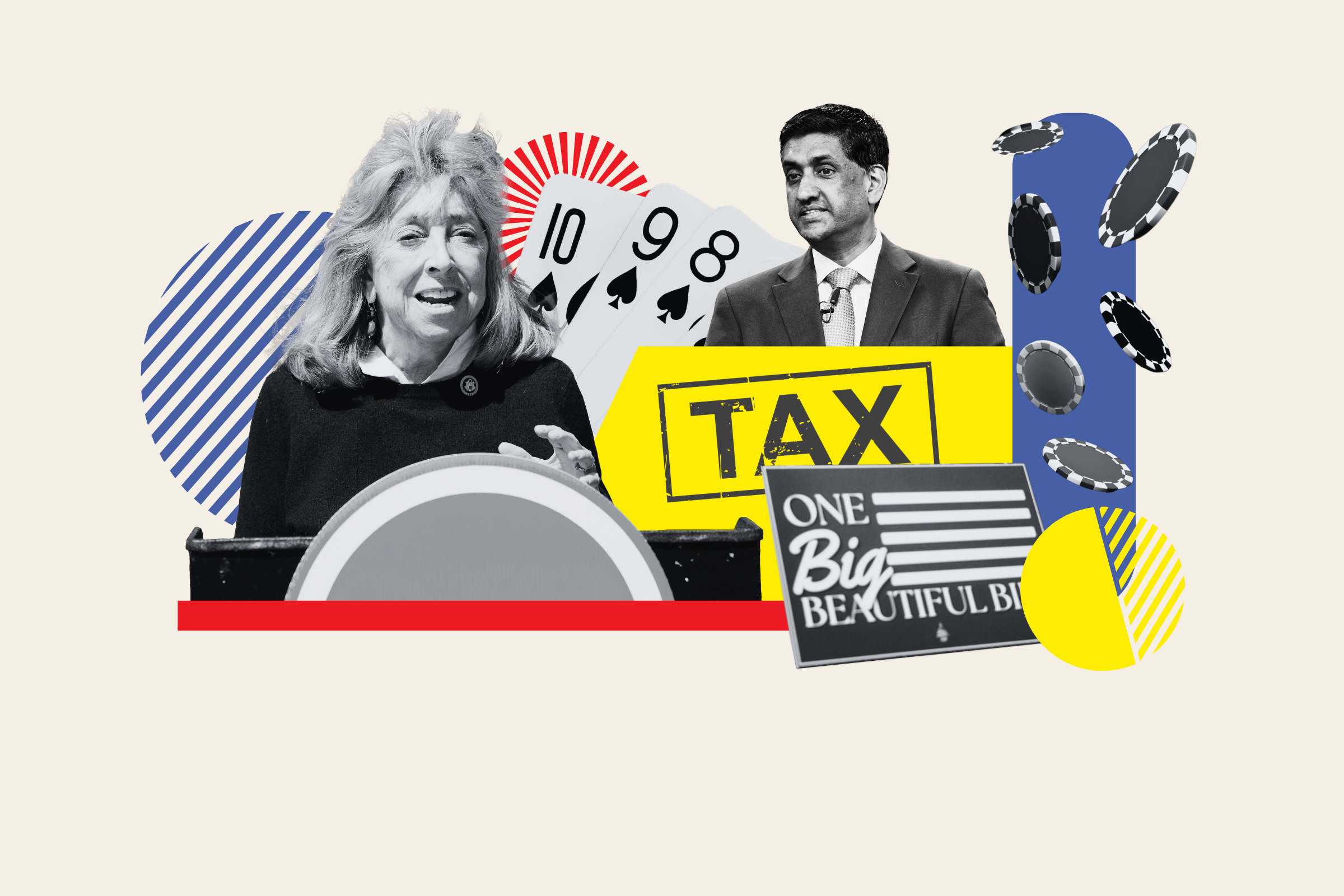Representative Dina Titus, a Nevada Democrat, has introduced legislation that would restore the 100 percent deduction for gambling losses that Senate Republicans reduced to 90 percent late in the passing of the One Big Beautiful Bill Act (OBBB).
Titus spoke with Newsweek about her Fair Accounting for Income Realized from Betting Earnings Taxation (FAIR BET) Act, which she says so far has garnered “10 times the response” from constituents in her state and beyond compared to other aspects of the OBBB.
Republican Representatives including Troy Nehls of Texas and Jeff Van Drew of New Jersey, also support Titus’ bill.
Why It Matters
The roughly 900-page bill passed by Congress included a provision inserted by Senate Republicans without consent of the House that imposed a tax increase on Americans who gamble, reducing from 100 percent to 90 percent the amount of losses they can deduct from gambling winnings for their income taxes.
The new provision, added by the Senate Finance Committee late in the legislative process ahead of the July 4 bill signing by President Donald Trump, means that gambling losses that have traditionally been fully deductible would no longer be so and gamblers could owe taxes even if they ended up with net losses in a year.
For example, someone winning $100,000 and then losing that same amount may still owe $10,000 in taxes on that income—even though they broke even.
What To Know
Titus, in an exclusive interview, said the issue has drawn more widespread attention on the OBBB compared to other scrutinized portions of the legislation, such as Medicaid and food stamp cuts.
“We’ve certainly heard from the industry, they’ve all kind of now gotten on board,” Titus said. “But I can tell you that we put out a lot of messages about that big, bad BS bill and we talked about Medicaid, we talked about food stamps, we talked about renewable energy, but this issue has gotten 10 times the response than any of those have.”
The congresswoman continued: “I think it’s people who are on the internet, I think it’s young people who found an issue that they can kind of identify with. And I don’t think it’s just limited to the people directly impacted by gaming in Nevada. It’s a national issue because now everybody can gamble on their phone, and so they’re writing in, they’re texting in, they’re calling in to say, ‘We should fix this.'”
Titus said she “found it hard to believe” that some Republican senators were unaware of this provision in the bill’s final version. She doesn’t believe it was inserted from an ideological or partisan standpoint, however, but rather based on tax policy.
“Let’s just make it clear these are not just high rollers, these are not just the big professional poker players who itemize,” she said. “Think how many people bet on a football game or bet on their phone, and how much they advertise some of the sports betting apps. These are just ordinary people who bet.”
Titus added: “It’s not fair…I don’t think people are going to say, ‘I’m not going to gamble,’ but what they may say is, ‘Why would I itemize? Why would I turn this in if I’m going to have to pay tax on losses?'”
Gambling losses up to the amount of one’s winnings can be claimed but only if one itemizes their deductions. However, most don’t do that because they opt for the standard deduction and better tax break.
Titus also has a front-row seat to the benefits of the gaming industry, noting how cities like Las Vegas are important economically. People travel to gamble, spend on dining and shows, or just to watch poker championships—the “full ambiance” as she described.
“They’re going to go gamble on unregulated sources, whether it’s offshore or the black market or the predictions market that’s coming on so strong,” Titus said. “Those entities don’t pay taxes to the state, they don’t invest in brick and mortar, they don’t hire good union labor. In that sense it also hurts industry and a community’s economy.”

Americans Overwhelmingly Support Gambling
In its August 2024 report on Americans’ attitudes towards gambling, the American Gaming Association (AGA) said than half of all American adults (55 percent) participated in some form of gambling in the previous 12 months.
Roughly 122 million adult Americans, or 49 percent of the population, visited a casino for gambling or other entertainment purposes in that span—the highest level of casino visitation on record.
Nearly nine-in-10 (88 percent) Americans find casino gambling to be acceptable for themselves or others, the research found, with 59 percent of Americans finding gambling personally acceptable—another an all-time high.
The AGA represents major trade partners including Churchill Downs, DraftKings, MGM Resorts International and other big companies online and in casinos.
A gaming industry source told Newsweek that there is support for Titus’ legislation, adding that lawmakers or the Trump administration did not convey why this provision was included in the final bill.
“This could potentially have a very direct impact on a professional gambler or a very high-volume recreational gambler who chooses to itemize deductions….We’re committed to working with Representative Titus, as well as her co-sponsors in the House,” the source said.
Asked if Titus’ bill is unsuccessful, the source said there’s time to make legislative fixes between now and the spring of 2027 when people go to file their taxes for their prior calendar year.
“We’re motivated to get this done,” they said.
Financial Hit to Nevada
Efforts in the Senate, led by Democratic Senator Catherine Cortez Masto of Nevada, sought unanimous consent to restore the full deduction for gambling losses. That was unsuccessful.
Cortez Masto told Newsweek that she will continue to explore all options available to restore the 100 percent dedication for gambling losses and protect Nevada’s gaming and hospitality industries.
“Republicans’ hastily put-together bill is full of provisions that are completely counterproductive and harmful to Americans,” the senator said. “The provision limiting the wagering loss deduction will have a negative impact on Nevada, and it’s one of the many reasons I voted no.”
What People Are Saying
Representative Ro Khanna, a California Democrat, in a statement to Newsweek: “The Republican budget would kneecap sports and gambling by making Americans pay taxes on gambling losses. This is deeply unfair. I’m proud to introduce the FAIR BET Act with Rep. Titus to restore the 100 percent tax deduction for gaming losses.”
Professional poker player Daniel Negreanu told Poker.org: “I’m going to do everything I can to help make sure this isn’t a reality or a problem. And when I say everything, I mean everything. This law would be, as I understand it…not good at all. I’m going to reach out to people who are smarter than me on this. And then take measures to see if I can help in any way. And hopefully I can.”
Rufus Peabody, a professional sports bettor, told The Wall Street Journal: “More likely than not, I would owe more money in taxes than I actually made in 2026 if I continue betting. And so, as it stands, it becomes untenable to be a professional gambler.”
Phil Galfond, a professional poker player, wrote on social media: “This new amendment to the One Big Beautiful Bill Act would end professional gambling in the US and hurt casual gamblers, too,” “You could pay more in tax than you won.”
What Happens Next
The tax deduction change is going into effect on January 1, 2026, unless modified sooner by Congress. It won’t affect Americans’ tax returns until after that date.
Titus said the timeframe provides “a little bit of breathing room” for changes to take hold.

